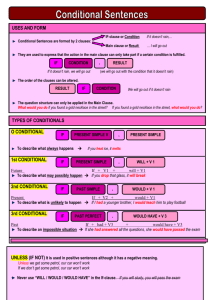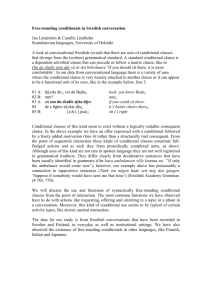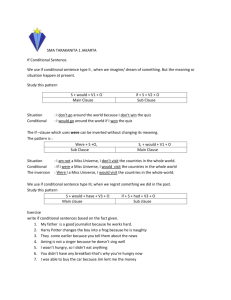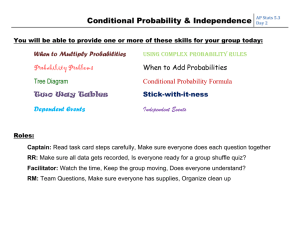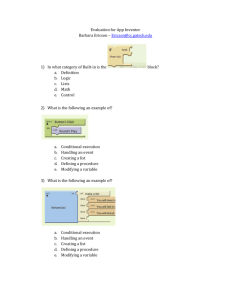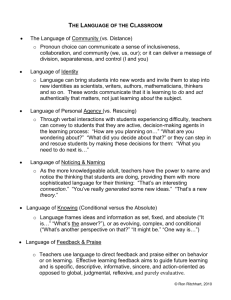If you see it, photograph it. (imperative sentence, condition first)
advertisement
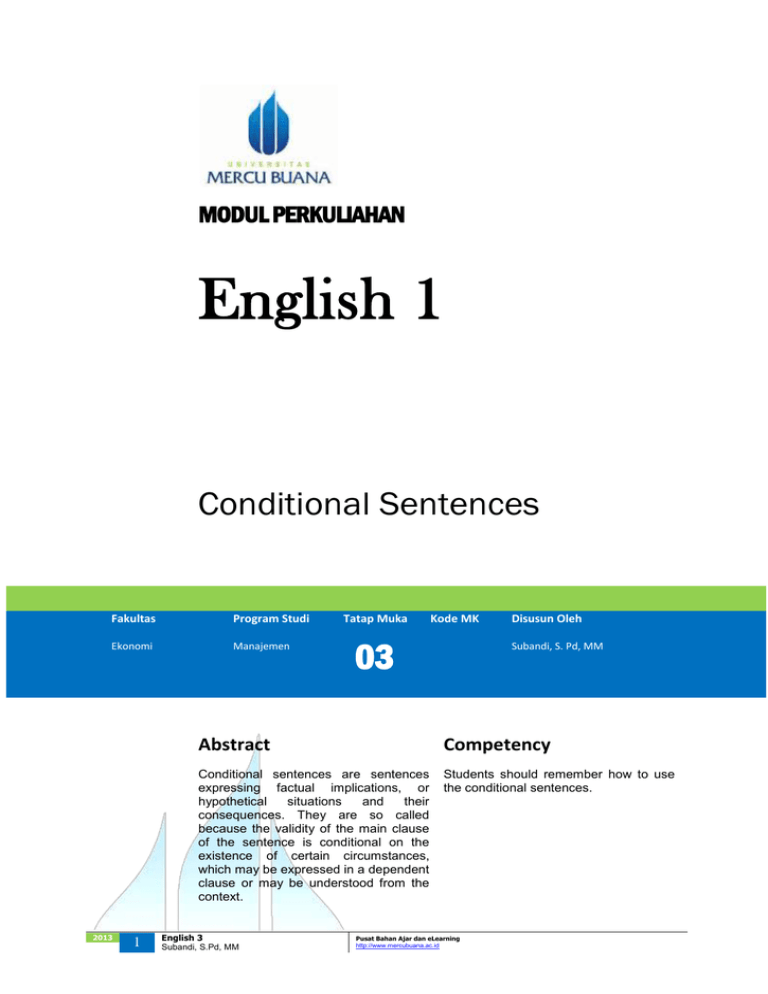
MODUL PERKULIAHAN English 1 Conditional Sentences Fakultas Program Studi Ekonomi Manajemen 2013 1 Tatap Muka Kode MK 03 Disusun Oleh Subandi, S. Pd, MM Abstract Competency Conditional sentences are sentences expressing factual implications, or hypothetical situations and their consequences. They are so called because the validity of the main clause of the sentence is conditional on the existence of certain circumstances, which may be expressed in a dependent clause or may be understood from the context. Students should remember how to use the conditional sentences. English 3 Subandi, S.Pd, MM Pusat Bahan Ajar dan eLearning http://www.mercubuana.ac.id The apodosis, expressing the consequence of the stated condition, is generally the main clause of the sentence. Depending on the sentence type, it may be a statement, question, or order. It may appear before or after the condition clause: If I see him, I will tell him. (declarative sentence, condition first) I will tell him if I see him. (declarative sentence, condition second) If you saw him, would you tell him? (interrogative sentence, condition first) Would you tell him if you saw him? (interrogative sentence, condition second) If you see it, photograph it. (imperative sentence, condition first) Photograph it if you see it. (imperative sentence, condition second) As with other dependent clauses in English, it is common for a comma to be used to separate the clauses if the dependent clause comes first (as is done in the above examples). See Comma: Separation of clauses. It is possible for the consequence clause to appear alone in a sentence, without a condition clause, if the condition has been previously stated or is understood from the context. It may also be shortened by verb phrase ellipsis; a minimal conditional sentence could therefore be something like "Would you?" or "I would." In English language teaching, conditional sentences are often classified under the headings zero conditional, first conditional (or conditional I), second conditional (or conditional II), third conditional (or conditional III) and mixed conditional, according to the grammatical pattern followed, particularly in terms of the verb tenses and auxiliaries used. These patterns and their variations are described in the following sections. 1. Zero conditional "Zero conditional" refers to conditional sentences that express a factual implication, rather than describing a hypothetical situation or potential future circumstance (see Types of conditional sentence). The term is used particularly when both clauses are in the present tense; however such sentences can be formulated with a variety of tenses/moods, as appropriate to the situation: If you don't eat for a long time, you become hungry. If the alarm went off, there's a fire somewhere in the building. If you are going to sit an exam tomorrow, go to bed early tonight! If aspirins will cure it, I'll take a couple tonight. 2013 2 English 3 Subandi, S.Pd, MM Pusat Bahan Ajar dan eLearning http://www.mercubuana.ac.id expressions) where will, would and could may be used in such clauses; see Use of will and would in condition clauses below. For the occasional use of the subjunctive in the condition clause, see under zero conditional above. In colloquial English, an imperative may be used with the meaning of a condition clause, as in "go eastwards a mile and you'll see it" (meaning "if you go eastwards a mile, you will see it"). Although the consequence in first conditional sentences is usually expressed using the will (or shall) future (usually the simple future, though future progressive, future perfect and future perfect progressive are used as appropriate), other variations are also possible – it may take the form of an imperative, it may use another modal verb that can have future meaning, or it may be expressed as a deduction about present or past time (consequent on a possible future event): If it rains this afternoon, come round to my place! (imperative) If it rains this afternoon, we can/could/should/may/might find somewhere to shelter. (other modals) If it rains this afternoon, then yesterday's weather forecast was wrong. (deduction about the past) If it rains this afternoon, your garden party is doomed. (deduction placed in the present) A particular case involves a condition clause that expresses a goal (this is often done using the be + to construction, the going-to future or the verb want), and the main clause expresses something that is necessary for the achievement of that goal, usually using a modal verb of necessity or obligation. In this case it is effectively the main clause, rather than the dependent condition clause, that expresses a "condition". If we want to succeed, we have to try harder. If you are to get your pocket money, you must start behaving yourself. As noted in the following section, it may be possible to express a statement about a hypothetical future situation using either the first or second conditional pattern, with little specific difference in meaning. 2. Second conditional "Second conditional" or "conditional II" refers to a pattern used to describe hypothetical, typically counterfactual situations with a present or future time frame (for past time frames the third conditional is used). In the normal form of the second conditional, the condition 2013 3 English 3 Subandi, S.Pd, MM Pusat Bahan Ajar dan eLearning http://www.mercubuana.ac.id
